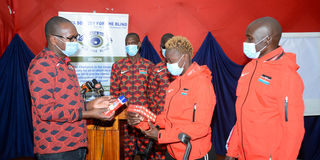Coach Kirwa: We need support as this is just a temporary setback

Kenya’s Paralympics Team Manager Stanley Mutuma (left) presents para rower Asiya Sururu Mohamed with medicines for team use at the Paralympic Games with head coach Henry Kirwa (right) and other team members in attendance last week in Nairobi. The medicines were donated by BioPharma Limited.
What you need to know:
- Kirwa will be among athletes and officials departing from Tokyo Thursday with the last group expected to leave the Olympic and Paralympic venue on September 6 after the closing ceremony.
- He hopes it won’t be another four-year wait for something tangible to come around.
In Tokyo
While training for the Tokyo Paralympic Games at Kasarani two months ago, Team Kenya head coach Henry Kirwa was approached by a National Police Service officer.
The policeman told Kirwa that he has two brothers back home in Kisii County, one who had an accident and another who was born blind.
He believed they have athletics talent and wanted Kirwa, himself a four-time gold medallist in the Paralympics, to give them a chance.
Kirwa, whose incredible collection of Paralympics silverware also includes two bronze medals, Tuesday said the policeman’s request indicated just how wide para sports talent is in Kenya.
Kirwa, who is the head coach of Kenya’s Paralympics team here, maintains the fact that Kenya managed just one bronze medal in Tokyo shouldn’t kill the morale of para athletes.
He sees it as a temporary setback and remains positive Kenya will bounce back, especially due to the increased support para athletes were getting from the Ministry of Sports, Culture and Heritage.
“Previously, we would go into camp for two weeks before competition, but for Tokyo, the government kept us in a training camp for two months at the Utalii Hotel.
“This was quite encouraging and a big departure from my running days.”
Kirwa now wants training camps put up for para athletes as they need them as much, if not more than, able-bodied athletes.
He’s also calling for coaches not to discriminate against para athletes and allow them to train in mainstream programmes.
“During my days, I used to train with the likes of Eliud Kipchoge in Ngong, Karura and other areas and I used to be faster than some of them.
“It is such training that enabled me to win four gold medals and two bronze.
“We should not be discriminated against. We should be treated equally as we are no lesser human beings,” he stressed.
Kenya managed just one bronze medal at the Tokyo Paralympics through Nancy Chelangat Koech in the 1,500 metres’ T11 class (for athletes with visual impairment).
Kirwa said the challenging outing in Tokyo also pointed to the fact that Kenya needs to change tack.
“We are used to training in high altitude areas only, but we must diversify and train in hot and humid areas like the North Eastern part of Kenya and Turkana.
“From what I gather here is that our opponents varied their training to accommodate familiarisation with the hot and humid conditions we have experienced here in Tokyo.”
Besides training camps, Kirwa, the 2008, 2012 and 2016 Kenya Para Sportsman of the Year, said stadiums need to be made friendly to para athletes who also need equal opportunities for employment.
“While able-bodied athletes have jobs, good contracts with shoe companies and steady sources of income, we para athletes have to wait for years for the Paralympic Games to come around in order to make some considerable income,” he argues.
Kirwa will be among athletes and officials departing from Tokyo Thursday with the last group expected to leave the Olympic and Paralympic venue on September 6 after the closing ceremony.
He hopes it won’t be another four-year wait for something tangible to come around.




